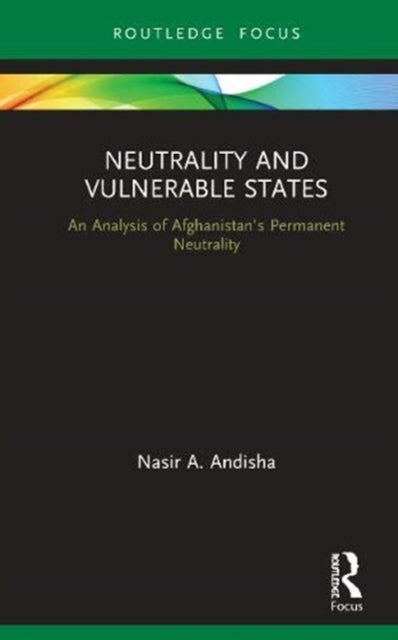Nasir Ahmad Andisha
Neutrality and Vulnerable States: An Analysis of Afghanistan's Permanent Neutrality
Neutrality and Vulnerable States: An Analysis of Afghanistan's Permanent Neutrality
YOU SAVE £2.50
- Condition: Brand new
- UK Delivery times: Usually arrives within 2 - 3 working days
- UK Shipping: Fee starts at £2.39. Subject to product weight & dimension
Bulk ordering. Want 15 or more copies? Get a personalised quote and bigger discounts. Learn more about bulk orders.
Couldn't load pickup availability
- More about Neutrality and Vulnerable States: An Analysis of Afghanistan's Permanent Neutrality
This book provides a timely and concise academic and historical background to the concept and practice of neutrality, evaluating the feasibility of reframing, adopting, and applying a policy of neutrality in the twenty-first-century world order. It compares and contrasts the two successful European case studies of Austria and Switzerland and the two challenging Asian case studies of Afghanistan and Laos, creating a new framework of analysis to explore the feasibility of "new neutrality".
Format: Hardback
Length: 142 pages
Publication date: 09 October 2020
Publisher: Taylor & Francis Ltd
Neutrality, as a relatively recent concept in foreign and security policy, is explored in depth in this comprehensive book. It addresses two crucial questions: when can permanent neutrality be effectively applied, and what are the key factors for success and failure in implementing it? Through a comparative analysis of two successful European case studies (Austria and Switzerland) and two challenging Asian case studies (Afghanistan and Laos), the author develops a novel framework of analysis to assess the feasibility of adopting and applying a policy of neutrality. The book initiates a debate by questioning whether a reframed and adapted version of neutrality could serve the needs of the twenty-first-century world order, similar to its role in resolving conflicts during the Cold War.
This insightful book is a valuable resource for scholars, students, and policymakers engaged in international relations, security studies, the history of neutrality, and Afghanistan studies. It provides a comprehensive understanding of neutrality, its historical context, and the challenges and opportunities it presents in today's global landscape. By examining the experiences of different countries, the author offers valuable insights into the factors that contribute to the success and failure of neutrality policies, and sheds light on the potential implications for future international relations.
The book is organized into five chapters, each covering a different aspect of neutrality. The first chapter provides an academic and historical background to the concept and practice of neutrality, highlighting its emergence as a response to the complex challenges of the modern world. The second chapter explores the theoretical foundations of neutrality, examining the principles and arguments that underpin it. The third chapter examines the circumstances under which permanent neutrality can be applied, considering factors such as geography, history, and political structure. The fourth chapter compares and contrasts the two successful European case studies of Austria and Switzerland with the two challenging Asian case studies of Afghanistan and Laos, analyzing the factors that contributed to their success and failure. The fifth chapter proposes a new framework of analysis to explore the feasibility of reframing, adopting, and applying a policy of neutrality, and discusses the potential benefits and challenges of such a policy in the twenty-first-century world order.
Throughout the book, the author employs a rigorous and analytical approach, drawing on a wide range of scholarly sources and empirical evidence. The text is well-structured, with clear headings
paragraphs and headings to facilitate navigation. Additionally, the book includes an extensive bibliography.
In conclusion, this book is a must-read for anyone interested in international relations, security studies, the history of neutrality, and Afghanistan studies. It offers a comprehensive and insightful analysis of neutrality, providing valuable insights into its theoretical foundations, practical applications, and the challenges and opportunities it presents for the future of global politics. By examining the experiences of different countries, the author offers a valuable contribution to the ongoing debate about the role.
Weight: 296g
Dimension: 144 x 222 x 15 (mm)
ISBN-13: 9781138625785
This item can be found in:
UK and International shipping information
UK and International shipping information
UK Delivery and returns information:
- Delivery within 2 - 3 days when ordering in the UK.
- Shipping fee for UK customers from £2.39. Fully tracked shipping service available.
- Returns policy: Return within 30 days of receipt for full refund.
International deliveries:
Shulph Ink now ships to Australia, Belgium, Canada, France, Germany, Ireland, Italy, India, Luxembourg Saudi Arabia, Singapore, Spain, Netherlands, New Zealand, United Arab Emirates, United States of America.
- Delivery times: within 5 - 10 days for international orders.
- Shipping fee: charges vary for overseas orders. Only tracked services are available for most international orders. Some countries have untracked shipping options.
- Customs charges: If ordering to addresses outside the United Kingdom, you may or may not incur additional customs and duties fees during local delivery.


